


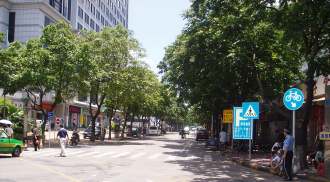
To sunny, exotic and charming Zhuhai. As with Shenzhen, its bigger counterpart across the Pearl River Delta, there are times when you stroll through the uncrowded, tree-lined avenues of this Special Economic Zone and ask why Hong Kong can’t be more like this. Not everywhere, of course. The waterfront promenade, affording on this very clear day a fine view of cloud-kissed Lantau, smells strongly of ordure, bringing back overpowering memories of stepping off the plane at Kai Tak a couple of decades ago. But in many parts of both Mainland towns, it is possible to envisage communities evolving, over the next 10 years perhaps, to offer an irresistible lure to residents of the Big Lychee, oppressed by ever-more psychopathic urban planning.
The seafood girlie restaurant proves disappointingly unexceptional. Of more interest is a huge bookshop – a sort of communist Borders. The inventory rivals that of the American chain in a big mall, except the volumes are mostly in simplified Chinese. To buy something, customers must a) line up for a voucher, b) line up to pay, c) line up to exchange a receipt for the item, d) finally take possession of the item after passing through security barriers at the exit. In the case of Jenny-the-girl-from-Beijing-but-she’s-got-an-American- passport, the purchase – a Chinese-English dictionary of chiropody, or some such obscure subject – had to be checked back in with security guards so she could come with me to the pride and joy of the place, the US-style in-store coffee shop. In exchange for a RMB50 per year membership fee, local children can come here and read the books all day every day – a (highly popular) bit of commercial lunacy that betrays the establishment’s state ownership, as if the customer sales process didn’t.
The highlight of Zhuhai is the sprawling shopping centre just downstairs from Mainland immigration. Many visitors from Macau go no further. You can’t buy livestock, heavy mechanical equipment or blatantly deadly weapons. Other than that, everything is here. There are acres of outlets. Tibetan handicrafts, bras in 100 colours, 100 ladies’ blouses in black, pet supplies, car ornaments, camping gear, cacti, wallets, belts, every type of female garment, men’s clothes, furniture, guitars, massages, food, etc, etc… I bought a knuckle duster (RMB20 for a dumb gwailo who can’t be bothered to haggle) and the complete South Park (42 DVDs in a lovely box for RMB340, after some bargaining.)
And here comes the quandary. I have just bought nine seasons of the infantile cartoon series. I would never buy one season of South Park DVDs for this much, though that is what it would cost, according to Amazon. So I am ‘stealing’ intellectual property. But I would never buy it at list price, so the intellectual property owners are losing nothing. How can I be stealing it? I presume that no-one apart from a few idiots buys it at list price – it’s fun, but not that good. With no TV, I will watch it on my PC, if at all. Anyone who has studied basic economics knows about demand elasticity. Combine that with something called morality elasticity, and we have the market in fake DVDs. And it is massive here. United 93 I saw a month or more ago. The Da Vinci Code is already here – can’t be bothered to watch it, though the asking price is RMB9, if you go through the fake door that looks like part of a women’s handbag stall. Hollywood needs to re-think its business model.
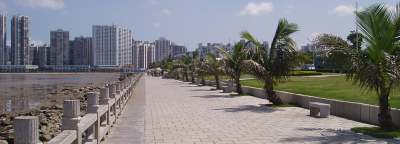
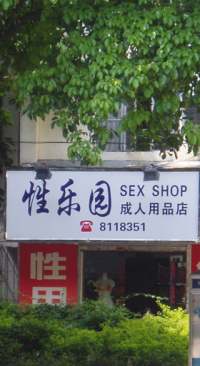

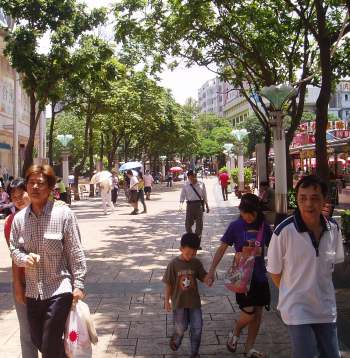

Ex-Chief Secretary Anson Chan annoys virtually everyone by endorsing this year’s 1 July march. By joining hands with the usual array of pro-democracy legislators at a press conference, she gives the pro-Government and pro-Beijing forces a slap in the face. In particular, she criticizes Donald Tsang’s Commission for Strategic Development, which circulates discussion papers asking such questions as, “Would universal suffrage lead to sharp upturns in infant mortality, crop failures, rat infestations, teenage pregnancy and the collapse of tall buildings onto adjacent orphanages, and, if so, what could be done to minimize such effects?” The former colonial running dog meanwhile irritates the rest of us, who were hoping to discreetly skip this year’s slow walk along baking streets in the blazing sun. An email from Polly the lipstick lesbian reminds me and no fewer than 50 others that, the conscience of the fragrant harbour having spoken, attendance is now de rigeur. She adds, with little apparent enthusiasm, that everyone is encouraged to wear pink, sky blue or pale yellow – incontrovertible evidence that the pro-democracy movement is being hijacked by an ambitious erstwhile civil servant with a wardrobe full of pastel cheongsams. I will wear pearl earrings.
Chinese People's Political Consultative Conference Chairman Jia Qinglin arrives in the Big Lychee...
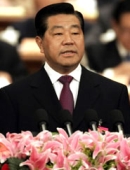
The chubby faced Jia will unveil several barely noticeable economic ‘concessions’, allowing Hong Kong companies to conduct business in Renminbi in ways they are either already doing, or don’t particularly want to do. This will be welcomed with embarrassingly grandiose displays of gratitude by our officials, at which point all 7 million inhabitants of Hong Kong will drop to their knees and sob pitifully, so moved will we be at the selfless generosity of the Central People’s Government towards our unworthy, formerly barbarian-ruled city.
At no time will anyone ask awkward questions that might raise doubts about Hong Kong’s fate in the nine years since the handover. No-one will dispute the unstated assumption that the city (8% 1st quarter year-on-year GDP growth) should need economic favours from the glorious motherland. Certainly no-one will ask how we ended up in this demeaning, supplicant position, or at least feel we have. We will accept, without question, that it is patriotic to need and depend on Beijing’s charity, disloyal to be confident – as we once were – about making our own economic way in the world. And no-one will point out the contradiction that the economic privileges are, anyway, worthless.
CEPA, the Closer Economic Partnership Arrangement, marginally trims Mainland tariffs on goods Hong Kong doesn’t manufacture, and widens service providers’ access to Mainland markets subject to mostly insurmountable conditions. The billions of dollars’ worth of business officials refer to in relation to CEPA was happening all along – which is why it takes place ‘under the auspices’ rather than ‘because’ of the agreement. No-one will feel silly while bowing down and worshipping this vacuous PR gimmick designed to make Tung Chee-hwa look good in late 2003. No-one will remember that, under the British, Hong Kong had a long and proud tradition of shunning bilateral trade agreements on the grounds that it was an open and free market, and why isn’t everyone else?
To wrap up his visit, Jia will witness an entertaining ‘struggle session’ with Carrie Chan, who will be made to kneel on broken glass and criticize herself for shaming The Standard and indeed the whole of Hong Kong by not giving the electrical engineer-turned-apparatchik his correct title, namely Chairman of the 10th National Committee of the Chinese People's Political Consultative Conference. Then he will go home, and we will be allowed to use our roads again.
Wed, 28 June
Donald Tsang goes one better and drags the hapless CPPCC boss to Tin Shui Wai. I can think of various labels for the place – ‘Tuen Mun without the class’ or ‘Hong Kong’s human landfill’, perhaps – but not ‘a great place to take visitors’. Fortunately, the honoured guest’s obligatory, hallucinatory everything-is-wonderful spiel…

Thurs, 29 June

Up to 1980, any hungry Mainlander with the audacity and wits to sneak across the heavily patrolled border and make it south of Boundary Street got an ID card – the rest were kicked back to China. Thus the Big Lychee secured the crème de la crème of semi-skilled labour to power its rise as an industrial centre. Today, the knowledge-based economy needs a different sort of work force, which is why most developed countries have some sort of points-based system to attract quotas of people likely to create wealth, jobs and tax revenues.
Hong Kong’s first post-1997 attempt at this missed the point entirely. Dubbed the Capital Investment Entrant Scheme, the deal was – buy a luxury apartment and we’ll give you residency. It reflected Tung Chee-hwa’s deranged beliefs that Hong Kong was short of money and high property or asset prices were the cause of economic strength. The typical migrant was probably an octogenarian Indonesian Chinese looking for somewhere to park ill-gotten loot.
In S-Meg Tower, I pick up the newspaper. Visa-Processing Bureaucrats Produce Nightmarish, Cretinous Quality Migrant Admission Scheme, says the headline.
‘Quality’ Hong Kong-style. Credentials and brand names are everything. Nobel Prize or Olympic medal? Come in – damned if we can see how you’ll create jobs, but it looks good. Two doctorates or more? That’s 45 points out of 80 – you probably have zero commercial, let alone social, skills, but how can we say no to someone with so many letters after their name? A spouse with degree-level qualifications or kids? More points – let’s have a Singapore-style programme to breed little university graduates.
This is the Tung Scheme Mark 2. Instead of the already-rich, we are targeting the already-successful. But what Hong Kong needs is tomorrow’s winners. Line them up at the airport for a literacy test, check their teeth and let them in. Young people who are smart and ambitious rather than over-educated. Ready to take risks. A little bit desperate, perhaps. People who are single, in their 20s, not encumbered with family. People from dumps – Filipinos, Indians, Mainlanders – who want to get somewhere. People who can run rings around our home-grown dullards in spiky ginger hair who listen to Cantopop, stare at Hello Kitty mobile phones, read comic books and end up as real estate agents. But of course we can’t have that. It might upset them and our labour activists. Hong Kong – once a magnet for the tired, the poor, the homeless, the tempest-tost – is now the land of ‘various sectors’ petrified of having to compete with the world.
to find this land, across the sea
We are the lost and found,
the malcontents, the emigrants
An email from Polly advises people on what to bring to tomorrow’s march – “a large bottle of water, a hat, an umbrella, sun cream, energy bar, poster (page 1 of Apple Daily), mobile phone in case you get lost...” I don’t expect to get lost in Causeway Bay, though there is a very high probability that I will mysteriously go missing as the procession passes through Wanchai. “…12 cleft sticks, a collapsible canoe and an astrolabe.”
After taking part in photo-ops, spouting the usual meaningless slogans and unveiling emergency aid in the form of economic ‘concessions’, Jia Qinglin leaves town. Had he been available for interviews, he might have had the highest profile of any personality in Hong Kong during the last week. But that accolade goes to someone else. If anyone had forgotten how irritating Anson Chan used to be back in the good old days of Governor Chris Patten, they simply had to listen to RTHK over the last few days. The calculated vagueness of her comments, the very obvious absence of self-doubt, and (when speaking in English) the exaggerated British intonation – how the memories come flooding back. On the subject of her proposed “new avenues of communication” between Hong Kong people and Beijing, she says…
“I don't necessarily insist these should be formal or informal.”
Open-minded and absolutist in one breath. She will boost turnout at the march, which is why there are mutterings emanating from the darker, more Neanderthal end of the pro-Beijing spectrum about her sudden burst of activity being part of a British and American plot to wipe the glorious motherland off the face of the Earth. Which brings me rather neatly to the headline in today’s Post…
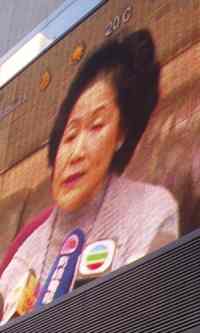
As I chew kimchi and sliced pork, she shares some gossip on the shoeshiners who will be getting Bauhinia Medals and other colonial-style baubles in tomorrow’s Honours List. This attracts the attention of a youngish, map-reading couple of tourists sitting at the next table – probably British or Commonwealth, judging by their apparent interest in this imperial tradition. Winky then tells me about how the Government is thinking of transferring cash to needy citizens through stored-value cards. Or as she puts it – “The Social Welfare Department might look at the possibility of delivering welfare payments by Octopus.” The two eavesdroppers look at each other in mild alarm.